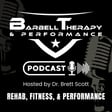
How to balance strength and cardio for optimal fitness with Jason Brown, PHD
Join Dr. Brett Scott in this insightful episode of the Barbell Therapy Podcast as he talks with Jason Brown, a leading voice in strength coaching and conjugate programming. They unpack the fundamentals of the conjugate method, its adaptability across fitness levels, and why aerobic capacity matters more than you think. Jason opens up about his own experience with the system and shares strategies for managing the overlap between strength and cardio training. The episode also touches on key topics like weight loss challenges, genetic individuality, and how to structure training for real-world results. A great listen for anyone aiming to level up their performance and programming approach.
KEYWORDS:
Conjugate programming, strength training, aerobic conditioning, fitness, program design, longevity, powerlifting, training methods, exercise science, recovery, weight loss, cardio, training split, full body training, strength training, nutrition, program evaluation, fitness goals, exercise science, hypertrophy.
TAKEAWAYS:
Conjugate programming allows for training multiple qualities of fitness simultaneously.
The aerobic system is crucial for recovery and overall fitness.
Conjugate training can be tailored to various athletic goals, not just powerlifting.
Personal experience with conjugate training led to significant performance improvements.
Aerobic conditioning enhances recovery and performance in strength training.
Balancing strength and cardio is essential for long-term fitness success.
Training splits should accommodate both strength and aerobic work for best results.
The interference effect can impact training outcomes when combining different modalities.
Consistency in training is key to achieving fitness goals.
Engaging in aerobic work can improve overall health and longevity. Weight loss is primarily about being in a caloric deficit.
Cardio is essential for heart health, not necessarily for weight loss.
Strength training is more effective for improving insulin resistance and metabolism.
Full body training is suitable for all fitness levels and maximizes efficiency.
Soreness is not a good indicator of workout effectiveness; mechanical tension is key.
Quality of training is more important than quantity; effort matters.
Nutrition and sleep are critical components of fitness success.
Many popular training programs lack scientific backing and can be ineffective.
Consistency and commitment to a program yield better long-term results.
Understanding personal goals and limitations is crucial for effective training.
CHAPTERS:
00:00- Introduction to Conjugate Programming
01:11- Understanding the Conjugate Training System
04:21-The Versatility of Conjugate Training
08:11- Personal Journey with Conjugate Training
11:00- Principles of Conjugate Programming
15:28- The Importance of Aerobic Conditioning
21:16- Interference Effect in Training
33:29- Balancing Strength and Cardio Training
38:41- Understanding Weight Loss and Cardio
44:10- The Ultimate Training Split: Full Body vs. Others
50:49- Goals and Effectiveness of Full Body Training
55:01- The Power of Effort in Training
01:00:24- Evaluating Popular Training Programs
